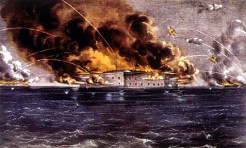We never got to the war part of the Civil War
/The problem with American History class was that never got to the good stuff. Take the Civil War. I recall with blinding acuity the days and weeks that we spent studying the causes of the Civil War, many of which are now being debunked by modern day historians who now claim that the war was mostly about slavery.
Hour upon hour dedicated to the study of the economic disparity between the North and the South, the debate over state’s rights, the difference in cultures, and more. I remember sitting in my seat, listening to the lecture, praying that we would turn the page and finally see cannons firing, soldiers marching and battles erupting.
And then it did.
On April 12, 1861, Confederate forces fired on the federal troops at Fort Sumter. An artist’s rendering of the beginning of the battle was splashed across the page of my history book. I can still see it in my mind’s eye.
Three classes later, the war was over.
Three days.
Since high school, I have read entire books about the Battle of Gettysburg, the use of naval power in the war, Sherman’s march to the sea, the Battle of Chancellorsville, the Battle of Chickamauga, the changes in military leadership during the war and more.
All this and much, much more was covered in my high school history class in just three days.
I realize that there is a limit on the amount of time that a teacher has to teach the content, but if you want your students to be interested in history, you can’t strip out the best parts.
Yes, the causes of the Civil War are important, and yes, Reconstruction was an important time in our country’s history and in many way still impacts our nation today. These things must be learned.
But for a student, and especially a boy, to study the Civil War and not spend a day or two learning about the weapons used at the time and the tactics that led to the Union’s victory at the Battle of Gettysburg and the hunt for John Wilkes Booth following Lincoln’s assassination is doing a disservice to the student and to the study of history in general.
It’s conflict that makes history so compelling, and sometimes this conflict occurs on the battlefield. Not every student is going to spend his adult life reading about the intricacies of the war on his own, and especially not if the war has been sanitized and abbreviated in high school.
Leaving the guns and swords and blood out of history class is a mistake, and it’s one that I hope does not happen as often as I fear it might.
